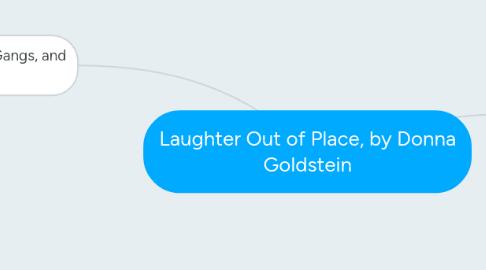
1. Chapter 4: No Time for Childhood
1.1. Mothers are often forced to exert extremes to prevent children from roaming the streets
1.2. "...When a woman has sex with a man she ought to know the consequences..." Pedras thoughts about his girlfriend having an abortion
1.2.1. Pedras also takes a strong stance of moralized double fidelity, as long as the man provides for the family
1.3. "King Baby Senario" in Rio
1.3.1. Although ironically 200,000 street children often slain by police
1.3.2. Used by gangs because prison sentences are usually less
1.3.3. Juvenile detention, source of developed criminal activities
1.3.3.1. Homicides are the leading cause of death for young males
1.3.4. Effect of wealthy children's lifestyle on impoverished children
1.4. After bad events have passed, they are often a source of humor
1.5. FUNABEM
1.5.1. Child Institution Abused Children
1.6. Mirellis story
1.6.1. Girls of the street are open to sexual predation
2. Chapter 5: State Terror, Gangs, and Everyday Violence
2.1. Why do so many young men in shantytowns die violent deaths
2.1.1. never ending cycles of revenge
2.1.2. lack of government intervention in any and all affairs within the favela
2.2. Crime and Violence in Rio
2.2.1. Middle and elite class preoccupied with crime
2.2.1.1. Fear not real, they experienced the least amount of crime.
2.2.2. Loest working classes experience everyday crime
2.2.2.1. Elitist liberalism - granting the right to civil liberties on a differential basis depending on some aspect of the persons social status and identify.
2.2.2.1.1. Historically hegemony is deeply rooted
2.3. Gangs
2.3.1. Perform functions beyond the trafficking of illegal substances
2.3.2. Drugs
2.3.2.1. Gang membership
2.3.2.1.1. Drugs chiefs of local importance
2.3.2.2. indebtedness
2.3.2.3. Addiction
2.3.3. Seductive Quality
2.3.3.1. Offer place of belonging
2.3.3.2. Offer a sense of identity
2.3.4. Nuisance for young men as well
2.3.5. Police treat the poor as criminals
2.3.6. Era of Braga
2.3.6.1. typical attitudes of police-bandit relations, people feel secure within boundaries of a certain kind of relationship
2.3.6.1.1. Homegrown leader not threatening in the same way as an outsider considered.
2.3.7. oppositional culture which fills in the gaps left by state abandonment
2.3.7.1. responsible for meting out justice
2.3.7.2. often protect communities from corrupt and often violent police
2.4. Police, Police Bandits
2.4.1. Viewed as colluding with criminals
2.4.2. Captures the sentiment that what is taken for granted about police is their absolute corruption
2.4.2.1. a "simple" beating from police is often viewed as being let off easy
2.5. Revenge Practices
2.5.1. Revenge is a stand in for a legal system that is absent or dysfunctional
2.5.1.1. the greater inability of the state to provide a policing and legal system that works , the more entities become involved in practically institutionalized ways
2.5.1.1.1. Solutions of "private matters"
2.6. "Brown Zones"
2.6.1. "low intensity citizensip"
2.6.1.1. no effective penetration of state authority
2.6.2. segregation of the classes
2.6.2.1. generational continuity of poverty
2.7. Religion
2.7.1. revivalist churches often offer much to people in poverty especially in urban slums and rural areas
2.7.2. response to everyday violence
2.7.2.1. frequent changing among religions is often an attempt for women to distance themselves from becoming "enmeshed" in the conflicts of men
2.7.3. often a gendered form of oppositional culture
